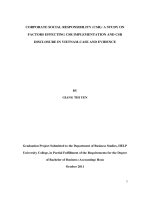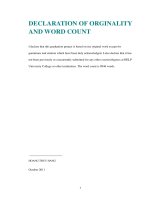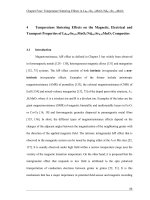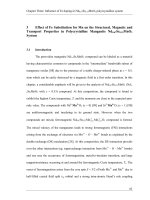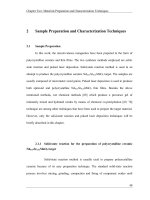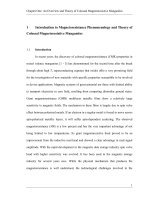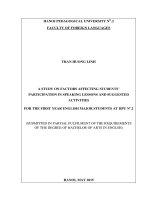DSpace at VNU: CORPORATE SOCIAL RESPONSIBILITY: A STUDY ON FACTORS AFFECTING CSR IMPLEMENTATION AND CSR DISCLOSURE IN VIETNAM 6Pham Duc Hieu
Bạn đang xem bản rút gọn của tài liệu. Xem và tải ngay bản đầy đủ của tài liệu tại đây (317.07 KB, 15 trang )
HỘI THẢO QUỐC TẾ
ĐÓNG GÓP CỦA KHOA HỌC XÃ HỘI – NHÂN VĂN TRONG PHÁT TRIỂN KINH TẾ - XÃ HỘI
CORPORATE SOCIAL RESPONSIBILITY: A STUDY ON FACTORS
AFFECTING CSR IMPLEMENTATION AND CSR DISCLOSURE IN
VIETNAM
TRÁCH NHIỆM XÃ HỘI CỦA DOANH NGHIỆP - CÁC NHÂN TỐ ẢNH
HƯỞNG TỚI THỰC HIỆN VÀ BÁO CÁO TRÁCH NHIỆM XÃ HỘI CỦA CÁC
DOANH NGHIỆP VIỆT NAM
PHAM Duc Hieu 1
Abstract
This paper aims to examine how executives and managers from different Vietnamese
enterprises represent their awareness and their perceptions of Corporate Social Responsibility (CSR),
as well as whether the attitude of Vietnamese consumers towards CSR is positive. Based on the
quantitative analysis, the paper provides evidence that while a large proportion of managers express a
highly positive attitude towards CSR and its reporting, consumers’ perception is at low state and
questionable. But the hypothesis testing shows that there seems to be a discrepancy between what
managers say they do and what they actually do. Nevertheless, the willingness to learn and gain more
knowledge about CSR found from the survey has drawn a bright future for CSR implementation and
CSR disclosure in Vietnam.
Key words: Corporate Social Responsibility (CSR), Vietnam, perception, awareness.
Tóm tắt
Bài viết nghiên cứu nhận thức và thái độ của các nhà quản lý tại các doanh nghiệp Việt nam về
thực hiện trách nhiệm xã hội của doanh nghiệp, cũng như thái độ của người tiêu dùng Việt nam về
công bố thông tin thực hiện trách nhiệm xã hội của doanh nghiệp. Trên cơ sở phân tích định lượng, bài
viết cho thấy trong khi đa số các nhà quản lý đều chứng tỏ sự hiểu biết khá cao về trách nhiệm xã hội
của doanh nghiệp cũng như nghĩa vụ báo cáo trách nhiệm xã hội, nhận thức và thái độ của người tiêu
dùng Việt nam lại ở mức khá thấp và cần phải tiếp tục nghiên cứu. Tuy nhiên, kết quả kiểm định các
giả thuyết thống kê lại cho thấy vẫn còn khoảng cách nhất định trong nhận thức và hành động của các
nhà quản lý trên thực tế. Dù vậy, thái độ sẵn sàng học hỏi để nâng cao hiểu biết về trách nhiệm xã hội
của doanh nghiệp thu được từ kết quả điều tra cũng cho thấy khả năng tích cực trong thực hiện và
cơng bố thông tin về trách nhiệm xã hội của các doanh nghiệp Việt nam thời gian tới.
1
University of Commerce, Ha noi, Vietnam. E-mail:
48 TÀI LIỆU PHÁT TRONG HỘI THẢO
HỘI THẢO QUỐC TẾ
ĐÓNG GÓP CỦA KHOA HỌC XÃ HỘI – NHÂN VĂN TRONG PHÁT TRIỂN KINH TẾ - XÃ HỘI
1. Introduction
Corporate Social Responsibility (CSR), also known as Social responsibility of business, is no
stranger to the developed world. It becomes a contemporary issue not only for companies but also for
consumers in the world. In fact, there have been a number of suggestive examples, such as Nike
Corporation had been ostracized for harsh working conditions in the East and the Southeast Asia; GAP
was attacked for using child labor, or any acts causing environmental pollution can also damage the
reputation of a big company.
In Vietnam, CSR is still a relatively new concept for many reasons, of which the lack of
awareness of the issue from the public and business community has been considered as the key factors
affecting on the CSR practices. However, as a result of the economic integration process of Vietnam,
public and business attitude towards CSR has been changing steadily. More recently, Vietnamese
enterprises have been more active in their social responsibility in various forms, such as: health care for
consumers, granting scholarships to students, supporting environmental protection activities... To date,
however, only a few studies in Vietnam focus on factors affecting on CSR practices and its reporting
which this study attempts to address.
The remainder of this paper is organized as follow. The first part is the theoretical framework
and research hypothesis development; the second part describes the research methodology and data
collection process; the third presents the results of hypothesis testing and discussions; the fourth part is
the recommendations and implications for future research.
2. Literature review and hypothesis
2.1.
Theory framework
The conceptualization of CSR is based on two key questions: for what are corporations
responsible? and to whom are they responsible? (Friedman, 1970). These questions have engendered
much philosophical and legal debate. A precise, universally accepted definition of CSR is therefore
difficult to achieve, with views on where a firm’s responsibility to society starts and finishes as various
as the names given used to describe such a notion, including corporate citizenship (e.g., Maignan,
Ferrell, and Hult, 1999), stakeholder management (e.g., Freeman, 1984), corporate social
responsiveness (e.g., Miles, 1987), corporate social performance (e.g., Wood, 1991), and corporate
social responsibility (e.g., Carroll, 1979).
For the purpose of this study, the term corporate social responsibility (CSR) will be used to
describe how business acts to implement the broad societal responsibility of going beyond economic
criteria, such as creating products, employment, and profits, to meet broader social and environmental
expectations. The term CSR is preferred as it maintains the focus on the issue of responsibility to
society as a whole, and it is a term that corporations are increasingly using, both internally and in their
communication efforts with external audiences.
49 TÀI LIỆU PHÁT TRONG HỘI THẢO
HỘI THẢO QUỐC TẾ
ĐÓNG GÓP CỦA KHOA HỌC XÃ HỘI – NHÂN VĂN TRONG PHÁT TRIỂN KINH TẾ - XÃ HỘI
According to The World Business Council for Sustainable Development (2004), CSR is
expressed as: “the commitment of business to contribute to sustainable economic development, working
with employees, their families, the local community and society at large to improve their quality of life,
in ways that are both good for business and good for development”. This position is generally
interpreted as business’ commitment to minimizing negative externalities and maximizing beneficial
impacts on society (Mohr, Webb and Harris, 2001).
Various theories about CSR have been introduced, of which are emerged two important theories
for this study, namely: the Triple bottom line (Elkington, 1997) and the Stakeholder theory (Freeman,
1984).
¾
Elkington’s 1997 triple bottom line
The triple bottom line theory introduced by Elkington in 1997 is known as a common way for
companies to conceptualize CSR. The concept of triple bottom line captures an expanded spectrum of
values and criteria for measuring organizational success: economic, environmental and social. In
practical terms, triple bottom line means expanding the traditional reporting framework to take into
account ecological and social performance in addition to financial performance. The triple bottom line
demands that a company’s responsibility lies with stakeholders rather than shareholders. Accordingly,
the business entity should be used as a vehicle for coordinating stakeholder interests, instead of
maximizing shareholder profit. For these reasons, the triple bottom line theory sets directions and
principles to evaluate and report companies’ CSR achievements.
¾
Stakeholder theory
The stakeholder theory, originally detailed by Freeman (1984), is a theory of organizational
management and business ethics that addresses morals and values in managing an organization. In this
theory, the concept “stakeholders” refers to any group or individual who is influenced, either directly or
indirectly, by the actions of the firm. In the traditional view of the firm, the shareholders view, the
shareholders or stockholders are the owners of the company, and the firm only addresses the needs and
wishes of its owners. However, stakeholder theory argues that there are other parties involved,
including governmental bodies, political groups, trade associations, trade unions, communities,
associated corporations, prospective employees, prospective customers, and the public at large. From
the ethical perspective, organizations have an obligation to treat fairly among stakeholders (Deegan,
2009); i.e., organizations are not managed the interest of shareholders alone, but a wide range of
stakeholders who have a legitimate interest in the corporation as well. In the case of stakeholder
conflict of interest, business has a duty to attain optimal balance among them.
Based on the Freeman’s theory, Baron (1995) had divided the stakeholders into two groups,
called market and non-market. While customers, competitors, employees, partners and suppliers often
seen as the market group; NGOs, government, regulators, environmental safety and standards
organizations, media, society or community are consider as the non-market group. Both these groups
exert their influences at different levels on the social responsibility pressures or motivations of the
50 TÀI LIỆU PHÁT TRONG HỘI THẢO
HỘI THẢO QUỐC TẾ
ĐÓNG GÓP CỦA KHOA HỌC XÃ HỘI – NHÂN VĂN TRONG PHÁT TRIỂN KINH TẾ - XÃ HỘI
company. From this perspective, many activities taken by the company are related to stakeholder’s
expectations (Friedman and Miles, 2002). It is meaningful to see that the concerning and satisfying the
interest of stakeholders help to improve corporate governance and accountability that includes
stakeholder communication and CSR reporting.
2.2.
¾
Hypothesis
Managers’ perception of CSR and CSR reporting
Hill and Jones (1992) describe the relationship between managers and stakeholders as
“Managers are the only group of stakeholders who enter into a contractual relationship with all other
stakeholders. Managers are also the only group of stakeholders with direct control over the decision
making process of the firm”. From this perspective, the stakeholders’ point of view to some extent is
affected by the managers’ behavior. In essence, for the CSR issues, it is necessary to have managers’
agreement and commitment to conduct and improve CSR initiative.
There are many responsibility pressures which influence the managers’ attitude. Such pressures
come from the profitability incentive goals or from a high level of expectations of investors or
significant creditors. Besides, managers are also influenced by community pressures that require them
to meet the expectations set up by the community.
In the context of Vietnam, two questions of management perception are crucial with respect to
CSR initiative: Do they consider sustainability as an important part of doing business? and why
managers address CSR as their strategic integration and competitiveness?
From the above discussions, the first hypothesis is formulated:
H1: In the context of Vietnam, managers’ perception of CSR and CSR reporting is positive.
¾
Consumers’ perception of CSR and CSR reporting
CSR has recently shifted to the field of marketing, and in particular the CSR-consumer
relationship, to understand how firms social, ethical, and environmental initiatives can influence
marketplace outcomes. Marketplace evidence suggests CSR is becoming a more salient purchase
criterion among consumers who not only expect businesses to be socially responsible, but also want to
be informed about what firms are doing, and will support firms that pursue CSR initiatives. A 23-nation
poll of public attitudes to CSR, for example, found that Australians have amongst the highest CSR
expectations of business (Environics, 1999): 45 percent of those surveyed believed the role of large
companies in society was to “set higher ethical standards and help build better society”, while only 8
percent believed it to be “make profit, pay taxes, create jobs, and obey the law”, and 43 percent
believed companies “should operate somewhere between the two positions”. Cone Inc (2004) found
that 86 percent of American respondents wanted companies to tell them how they supported social
issues. In the UK 74 percent of respondents indicated that more information on a company’s social and
ethical behavior would influence their purchasing decisions, and 86 percent thought companies should
actively communicate their CSR activities (Dawkins, 2004).
51 TÀI LIỆU PHÁT TRONG HỘI THẢO
HỘI THẢO QUỐC TẾ
ĐÓNG GÓP CỦA KHOA HỌC XÃ HỘI – NHÂN VĂN TRONG PHÁT TRIỂN KINH TẾ - XÃ HỘI
This study investigates how vietnamese consumers are informed about the social and
environmental conditions under which products have been produced. Drawing from the above
argument, the second hypothesis is formulated:
H2: In the context of Vietnam, consumers’ perception of CSR and CSR reporting is positive.
3. Research methodology
A structured questionnaire was used to collect the necessary data whereby it will serve as
primary data to answer the research questions and objectives pertaining to CSR practices and reporting
in Vietnam. The questionnaire comprises two patterns: one for management in 30 selected companies
operating in three main sectors, namely Banking, Brewery, and Clothing & Textiles; another for
consumers of these selected companies. Each patter of survey questionnaire consists of 8 statements
pertaining to the relationship between CSR perceptions and CSR practice and reporting. In view of
time and cost constraints, a convenience sampling method was used to collect data mainly from the
companies and consumers in Ha noi and Ho Chi Minh cities which have more concentration on CSR
issues. Even though the sampling method adopted has limitations in terms of generalisability compared
to other method of sampling, it is assumed that the sample represents the whole population of
companies and consumers in Vietnam. The survey was conducted mainly via face-to-face interviews,
also administered through e-mail and postage service. The two patterns use Likert five-point interval
scale that provides a battery of attitude statements. The respondents then say how much they agree or
disagree with each statement (the scale ranges from (5) denoting “strongly agree” to (1) denoting
“strongly disagree”). These results will be answered how deep their think about the CSR value.
4. Results and discussions
4.1.
Results and discussions from the management survey
With the selected sample size, 100 questionnaires for management have been distributed.
However, only 32 responses were considered complete and valid for data analysis. This represents a
success rate of 32%, which is considered to be good in view of time and cost constraints. The Figure 1
details the management responses
Figure 1: The number of management responses
Sample
Number of
response
Management pattern
‐
Banking
30
9
‐
Brewery
35
11
‐
Clothing & Textiles
35
12
52 TÀI LIỆU PHÁT TRONG HỘI THẢO
HỘI THẢO QUỐC TẾ
ĐÓNG GÓP CỦA KHOA HỌC XÃ HỘI – NHÂN VĂN TRONG PHÁT TRIỂN KINH TẾ - XÃ HỘI
Total
100
32
Figure 2 represents a list of statements. While Figure 3 illustrates the percentage of response
distribution, Figures 4 and 5 show descriptive statistics including median and mode.
Figure 2: Distribution of managers’ responses towards the statements
Statements
1. Organizing and participating in public welfare
activities are the social responsibility of the company.
6
2. Company has incurred extra costs for health and
safety working environment.
1
3
3.
CSR provides a favorable public image.
4
4. Involvement in improving community’s quality of life
will also improve long run profitability of the company.
2
0
5. Firm perceived as being socially responsible can
improve industry-labor relationship.
6
0
6.
CSR is good for strategic competitive advantage.
2
7. CSR reporting will have positive impacts on
investor’s decision.
8. CSR reporting will become general practice in near
future.
0
2
Note: 5= strongly agree, 4=agree, 3=neutral, 2=disagree, 1= strongly disagree
53 TÀI LIỆU PHÁT TRONG HỘI THẢO
3
0
HỘI THẢO QUỐC TẾ
ĐÓNG GÓP CỦA KHOA HỌC XÃ HỘI – NHÂN VĂN TRONG PHÁT TRIỂN KINH TẾ - XÃ HỘI
Figure 3: Percentage of managers’ responses towards CSR by five scale
The results of the Figures 2 and 3 show that five of the eight statements have scores of more
than 50% agreement or endorsement of CSR. About 75% respondents think organizing and
participating in public welfare activities are the social responsibility of the company. Moreover, 75% of
managers confirm that their company has spent extra costs improving working environment quality.
The majority of respondents (68%) think that engaging CSR, firm could get a favorable image within
the public, only 28% still wonder how CSR could impact on the image of companies, and very few
respondents (6%) do not believe that CSR will bring them any beneficial outcomes. Besides, more than
half of managers (56%) agree that being socially responsible will raise industry-labor relationship.
Furthermore, 63% of those express their belief on the bright future of CSR practice and CSR reporting.
It means that managers have realized the important role of CSR reporting, and they will be responsible
for this report in the coming years.
Figure 4: Descriptive statistics from management survey (1)
Statements
Median
Mode
1. Organizing and participating in public welfare
activities are the social responsibility of the company.
4
4
2. Company has incurred extra costs for health
and safety working environment.
4
4
54 TÀI LIỆU PHÁT TRONG HỘI THẢO
HỘI THẢO QUỐC TẾ
ĐÓNG GÓP CỦA KHOA HỌC XÃ HỘI – NHÂN VĂN TRONG PHÁT TRIỂN KINH TẾ - XÃ HỘI
3. CSR provides a favorable public image.
4
4
4. Involvement in improving its community’s
quality of life will also improve long run profitability
of the company.
4
4
5. Firm perceived as being socially responsible
can improve industry-labor relationship.
4
4
6. CSR
advantage.
3
3
7. CSR reporting will have positive impacts on
investor’s decision.
3
2
8. CSR reporting will become general practice in
near future.
4
4
is
good
for
strategic
competitive
Note: 5= strongly agree, 4=agree, 3=neutral, 2=disagree, 1= strongly disagree
Moreover, the median for these statements 1, 2, 3, 5, and 8 has the value 4 where 4 denotes
“agree”. The results show that managers have highly positive answers. Besides, the mode for these
statements is also 4; it means that the “agree” point is the most frequently happened. As a result, we
can conclude that managers’ perception of CSR is highly positive.
In contrast, there is also a quite large proportion of managers express a non-consistency in
opinion. Statement 6 represents 25% of directors still in doubt about the role of CSR in the view it is a
strategic integration and competitive for companies, and 8% do not believe CSR reporting is important
tool that can influence investors’ decision-making (statement 7). The influence of CSR on investors’
decision-making is still questionable as 31% of respondents remain neutral. They do not think CSR is
really important, so it has limited influence on investment decisions of investors.
Figure 5 Descriptive statistics from management survey (2)
Median
Statements
Clothing
&
Banking
Textiles
Brewery
Clothing
&
Textiles
4
4
4
4
4
4
4
3
4
4
4
Banking
Brewery
1
4
4
4
2
4
4
3
4
4
55 TÀI LIỆU PHÁT TRONG HỘI THẢO
Mode
HỘI THẢO QUỐC TẾ
ĐÓNG GÓP CỦA KHOA HỌC XÃ HỘI – NHÂN VĂN TRONG PHÁT TRIỂN KINH TẾ - XÃ HỘI
4
3
4
3
2
4
4
5
4
4
4
4
4
4
6
2.5
3
3
3
3
3
7
4
3
4
2
4
2
8
4
4
3
3
4
4
The analysis of median and mode showed that there were no significant differences in the
perception of managers working in Banking, Brewery and Clothing & Textiles towards CSR. But
managers in Brewery indicate stronger positive attitude in comparison with other two sectors. The
reason may come from the product features of that business because it has long been regarded as
consumer goods, directly and quickly affected to consumers health.
The Chi-square is used to test the relationship between managers’ perception towards CSR and
CSR reporting. The Chi-square value is 7.10 ( χ 2 = 7.10) while χα2 , ( r −1)(c −1) = χ.205, 6 = 12.59 (α = 0.05
and df = 6). Since χ 2 < χα2 , ( r −1)(c −1) = χ.205, 6 , the hypothesis H1 is rejected. In other words, management’s
awareness of CSR and CSR reporting is independent.
4.2.
Result and discussions from the customers survey
With the selected sample size, 200 questionnaires for consumers have been distributed.
However, only 97 responses were considered complete and valid for data analysis, representing a
success rate of 48.5%. The Figure 6 details the consumer responses.
Figure 6: Distribution of consumers’ responses towards statements
Statements
1. You know the meaning of the term “Corporate Social
Responsibility”.
2. Companies
initiatives.
should
conduct
social
4. If I bought products of a company with good social
responsibility practices, I would be more likely to continue
buying that company’s products.
8
4
3
4
5
4
8
5
2
9
responsibility
3. Donations to charitable and public welfare organizations
are obligations of a company.
56 TÀI LIỆU PHÁT TRONG HỘI THẢO
0
1
HỘI THẢO QUỐC TẾ
ĐÓNG GÓP CỦA KHOA HỌC XÃ HỘI – NHÂN VĂN TRONG PHÁT TRIỂN KINH TẾ - XÃ HỘI
5. I would
companies.
avoid
buying
products
from
immoral
6. I am willing to pay a premium for goods/services from
socially responsible companies.
5
8
9
0
4
4
7. I think it is important to examine companies’ CSR
strategies
4
5
6
8. I will make some changes in behavior for social
responsibility.
0
1
6
The results in the Figure 6 show that six of the eight statements have scores of more than 50%
agreement. About 71% of respondents know the meaning of “Corporate Social Responsibility”. It
reflects the fact that SCR is familiar to consumers. Furthermore, nearly 52% mentioned that companies
should conduct social responsibility initiatives. A majority of consumer (62%) express their want of
buying products of a company with good social responsibility practices. In addition, 51% of those
surveyed think it is important to examine companies’ CSR strategies. And 53% of respondents said
they would make some changes in behavior for social responsibility.
However, these results above are not meaning that consumers have strong support for
companies’ practices as about 69% of respondents still buy products from immoral companies. And a
majority either say “disagree” (56%) or “strongly disagree” (14%), for a total of 70% are aware that
they are not willing to pay a premium for goods/services from socially responsible companies.
57 TÀI LIỆU PHÁT TRONG HỘI THẢO
HỘI THẢO QUỐC TẾ
ĐÓNG GÓP CỦA KHOA HỌC XÃ HỘI – NHÂN VĂN TRONG PHÁT TRIỂN KINH TẾ - XÃ HỘI
Figure 7: Percentage of consumer’s responses towards CSR by five scale
3
S tatement 8
7
5
S tatement 7
3
S tatement 6
6
6
S tatement 1
37
37
14
14
56
0
30
8
8
8
S tatement 3
S tatement 2
37
21
7
0
S tatement 4
7
6
S tatement 5
32
21
30
11
19
9
26
14
10
54
35
27
14
9
9
S trongly agree
39
15
44
50
21
20
A gree
30
Neutral
40
Dis agree
50
60
S trongly dis agree
Figure 8: Descriptive statistics from consumer survey (1)
Statements
Median
Mode
1. You know the meaning of the term
“Corporate Social Responsibility”.
4
4
2. Companies
should
responsibility initiatives.
3
4
3. Donations to charitable and public welfare
organizations are obligations of a company.
3
4
4. If I bought products of a company with
good social responsibility practices, I would be
more likely to continue buying that company’s
products.
4
4
5. I would avoid buying products from
immoral companies.
2
2
6. I am willing to pay a premium for
goods/services
from
socially
responsible
companies.
2
2
conduct
58 TÀI LIỆU PHÁT TRONG HỘI THẢO
social
HỘI THẢO QUỐC TẾ
ĐÓNG GÓP CỦA KHOA HỌC XÃ HỘI – NHÂN VĂN TRONG PHÁT TRIỂN KINH TẾ - XÃ HỘI
7. I think it is important to examine
companies’ CSR strategies
4
2
8. I will make some changes in behavior for
social responsibility.
4
2
Figure 8 represents the median and mode from which further analysis of the research would be
explored. The first four statements have mode of 4, showing that there is a positive attitude toward
CSR from consumers. This means that CSR is familiar and important thing to consumer. However,
their support for efforts of companies to be responsible is not so strong. Preliminary findings in the
previous section portray a large of consumers failed to recognize the importance of CSR, and they are
not willing to pay a premium for goods/services from socially responsible companies. Those surveyed
respondents are too focused on price of the product rather than its quality and its friendliness to
environment.
Figure 9: Descriptive statistics from consumer survey (2)
Median
Statements
1
2
3
4
Mode
5
1
2
1
4
2
4
3
4
4
2
5
2
3
4
5
6
7
2
8
Note: A1= 20-30, A2= 30-40, A3= 40-50, A4= 50-60, A5=above 60 (years old)
Dividing respondents into five ranges of age as presented in Figure 9 gives some interesting
results. Overall, the descriptive statistics suggest that the young customers show the higher positive
attitude toward CSR than olders. Many of them are students and young workers with better education
so they pay more attention to companies’ CSR strategies. Young customers, however, are not willing to
59 TÀI LIỆU PHÁT TRONG HỘI THẢO
HỘI THẢO QUỐC TẾ
ĐÓNG GÓP CỦA KHOA HỌC XÃ HỘI – NHÂN VĂN TRONG PHÁT TRIỂN KINH TẾ - XÃ HỘI
pay a premium for goods or services from responsible companies. The reason is due to their low
financial status that does not allow them to buy products with high quality but high price.
The Chi-square is used to test the relationship between consumers’ perception towards CSR and
CSR reporting. The Chi-square value is 163.91 ( χ 2
= 163.91 ) while χα2 , ( r −1)(c −1) = χ.205,12 = 21.03 (α =
0.05 and df = 12). Since χ 2 > χα2 , ( r −1)(c −1) = χ.205,12 , the hypothesis H2 is accepted. In other words,
consumers’ awareness of CSR and CSR reporting is interdependent.
5. Conclusion
The research results have provided interesting findings on two factors affecting CSR
implementation and CSR reporting of enterprises in Vietnam. For managers, a high level of awareness
of CSR may not be a factor to ensure that enterprises will fulfill their CSR obligations and
requirements. For consumers, although they do not have a clear attitude, the research results show that
the awareness of Vietnamese consumers and their purchasing decisions influence significantly on the
CSR implementation as well as CSR disclosure of companies.
Although firms commit to provide high quality products and services at reasonable price as
important factors in being socially responsible, there are also gaps in CSR disclosure and management
belief. Due to the fact that there were lack of national standards and requirements from investors and
customers, Vietnamese companies are not willing to report their CSR activities. Therefore, customers
do not have or have very limited information about CSR implementation and CSR achievement of
companies; as a result, they do not realize the importance and benefits of CSR. The majority of
consumers focus on the price of products rather than CSR when making purchasing decisions.
However, a large proportion of consumers mentioned that in the course of integration Vietnamese
companies would change their behaviors, undertaken actions and show their responsibility for society.
Moreover, if government pays more attention to CSR, there will be a bright future for CSR to become
general practices in Vietnam.
Those findings have challenged for companies to solve CSR issues in which how to operate
effectively to bring added-value to customers, and how to improve the attitude and awareness of
customers towards CSR to gain their loyalty.
In order to achieve these target objectives, CSR should build on:
Social Responsibility: offer safety products and services, provide health and safety working
environment, ensure human rights, improve customers and employees satisfaction, and establish good
relationships with government and community...
•
Environmental Responsibility: protect and improve environment, reduce resources
consumption (materials, water, electricity...), improve waste management (3Rs strategies)...
•
Economic Responsibility: support the investors, pay taxes, create jobs, and improve risk
management…
•
60 TÀI LIỆU PHÁT TRONG HỘI THẢO
HỘI THẢO QUỐC TẾ
ĐÓNG GÓP CỦA KHOA HỌC XÃ HỘI – NHÂN VĂN TRONG PHÁT TRIỂN KINH TẾ - XÃ HỘI
The results of the research indicate that there is a perception gap in CSR issues between
managers and customers. The positive management awareness of CSR is essential but not enough for
the success of CSR implementation and practices. Therefore, consumers that have ability to “influence
the profits of competing firms, and indirectly also the direction of the economy” need to pay more
attention on whether companies’ activities are responsible to society or not (Hansen & Schrader, 1997).
Moreover, the Government should take several steps in supporting and promoting the growth of CSR
practice in the country. In this respect, the Government needs to establish commercial codes that
govern commercial transactions between businesses and consumers. These commercial codes and
practices will serves as a standard practice that cover various aspects of doing business, including CSR
disclosure requirements. Not only that, Government should set up learning programs related to CSR to
help raising the knowledge and awareness of the public. If the public have strong feeling and sensitive
for CSR issues, the environmental and social scandals might be prevented. Public positive awareness of
CRS also encourages firms to act and to behave responsibly and ethically.
Since, the study focuses on a small sample of companies in Hanoi and Ho Chi Minh cities, the
generalisability of the research findings is restricted. Theses limitations provide a basis for further
research, especially appropriately designed quantitative in combination with qualitative studies, to be
conducted to verify the findings of this study.
_____________________________________________________________________
References
Baron, D. P., 2005. Corporate Social Responsibility and Social Entrepreneurship. Working
paper series, Stanford University.
Carroll, A., 1979. A three-dimensional conceptual model of corporate performance. The
Academy of Management Review, 4(4), pp. 497-505.
Cone Inc, 2004. Cone Corporate Citizenship Study. Boston, MA.
Dawkins, J., 2004. The Public’s views of Corporate Responsibility, 2003. White Paper Series,
MORI.
Deegan, C., 2009. Financial Accounting Theory. 3rd Edition. McGraw-Hill Australia Pty Ltd.
Elkington, J., 1997. Cannibals with forks: The triple bottom line of 21st Century business.
Oxford: Capstone.
Environics, 1999. The Millennium Poll. Retrieved on 25th October, 2010, from
.
Friedman, M., 1970. The social responsibility of business is to increase profits. New York Times
Magazine, (September 13), pp. 32-33, 122, 126.
61 TÀI LIỆU PHÁT TRONG HỘI THẢO
HỘI THẢO QUỐC TẾ
ĐÓNG GÓP CỦA KHOA HỌC XÃ HỘI – NHÂN VĂN TRONG PHÁT TRIỂN KINH TẾ - XÃ HỘI
Friedman, A. and Miles, S. (2002). Developing stakeholder theory. Journal of Management
Studies, 39(1), pp.1-21.
Freeman, E., 1984. Strategic management: A stakeholder approach. Pitman Publishing,
Bostom.
Hansen, U. and Schrader, U., 1997. A modern model of consumption for a sustainable society.
Journal of Consumer Policy, 20(4), pp. 443-68.
Hill, C.W., Jones, T.M., 1992. Stakeholder-agency theory. Journal of Management Studies
(March), pp. 131-52.
Maignan, I., Ferrell, O.C., and Hult, G.T.M., 1999. Corporate citizenship: Cultural antecedents
and business benefits. Journal of the Academy of Marketing Science, 27(4), pp. 455-69.
Miles, R.A., 1987. Managing the Corporate Social Environment. Prentice-Hall, Englewood
Cliffs, NJ.
Mohr, L.A., Webb, D.J., and Harris, K.E., 2001. Do consumers expect companies to be socially
responsible? The impact of corporate social responsibility on buying behavior. The Journal of
Consumer Affairs, 35) (1), pp. 45-75.
Wood, J.D., 1991. Corporate social performance revised. Academy of Management Review, 16
(4), pp. 698-718.
World Business Council for Sustainable Development, 2004. Cross Cutting Themes –
Corporate Responsibility, Retrieved 30 November 2009, from .
62 TÀI LIỆU PHÁT TRONG HỘI THẢO

